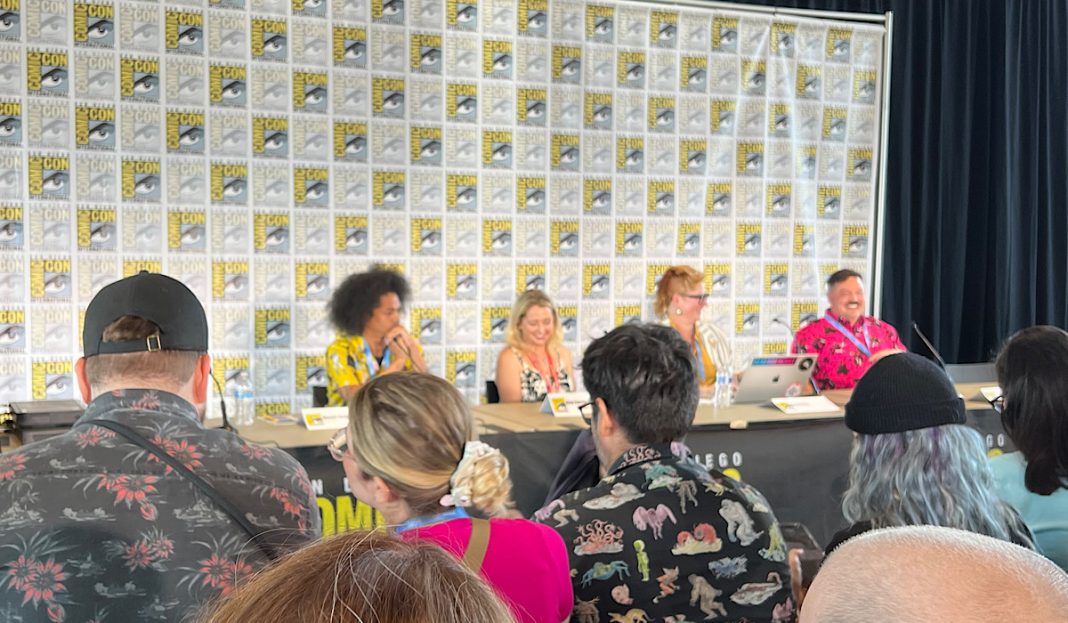Book bans and legislative control of reading materials are a very real thing. Whether it’s a blue state or a red state, agitators have mounted challenges to libraries across the nation to remove books that provide inclusive content to the public. “Libraries and the Challenges They Face,” the first panel at the San Diego Public Library’s Comic Conference for Educators and Librarians, addressed this issue. Betsy Gomez (ALA Office of Intellectual Freedom) moderated a panel of experts that included Mychael Threets (supervising librarian, Solano County Library), Moni Barrette (president, GNCRT; co-founder, Creators Assemble!), Jack Phoenix (collection development manager, Cuyahoga Falls Library; author, Maximizing the Impact of Comics in Your Library), and Francisco Soto (doctoral student; Drag Queen Storytime).
Gomez posed “ripped from the headlines” scenarios to each of the panelists. Many of these scenarios were real-world situations that have happened within library ecosystems around the country, and were centered around censorship as a direct result of the pandemic. The panelists responded with their personal experiences to each scenario, encouraging involvement and engagement from attendees to protect access to materials in public libraries.
How have you dealt with stress and burnout from the pandemic?
The panelists cited the difficulties of getting staff to take sick time and seek mental health counseling as ongoing issues since the pandemic.
According to Phoenix:
“We still come from this capitalistic work culture where using sick time is bad and using sick time is lazy, and so trying to get through to my staff to overcome the guilt and just please stay home has been really difficult.”
And Threets expressed the difficulty of getting library administration to provide mental health therapy for staff:
“It’s been very hard for libraries during the pandemic with mental health, like Jack said, with all the library users yelling at us with the difficulties and the challenges of everyone belonging to libraries.”
Barrette had similar experiences, although hers was colored by threats for starting Drag Queen Storytime and later working from home in her new position:
“It can be really isolating working from home with people that I hadn’t met [in-person],” said Barrette. “I think for better or worse, avoiding my mental health just by throwing myself into more, different projects and volunteer work has gotten me through, though I’m not going to say it helped.”
A graphic novel of an acclaimed prose novel is challenged over depictions of nudity in a scant handful of panels. The graphic novel is removed but the novel is not challenged or impacted by its removal. How do you handle this and protect intellectual freedom?
Each of the librarians vocalized the necessity to protect a readers’ right to read. Books should never be banned. Comics and graphic novels are accessible, and protecting accessibility is important. Challengers do not care and take content out of context.
“Everybody should have access to something,” said Threets. He cited a quote about how libraries should have something that offends everyone, saying, “I’m very proud of that.”
Barrette added that challenges often originated outside of the community. She said she would quiz the challenger with questions, such as, “Are you a library card holding member of this actual community? Is this where you vote? Is this where you really live? Does this actually affect you? And also, have you actually read the book in question? One thing to understand about comics and graphic novels specifically,” she went on, “Is they are more likely to be banned and challenged for several reasons, including the stigma that still exists about comics and manga as not real reading. Illustrations make them easy targets.”
This next scenario has happened in multiple locations in Texas where graphic novel adaptations of The Handmaid’s Tale and The Diary of Anne Frank in particular have been demanded to be removed because of the depiction of nudity. Since a prose novel was available, they devalued the graphic novel and said that graphic novels were not valid reading or academically rigorous enough to have in school libraries. What would you say to the people making these arguments and convince them otherwise?
Phoenix argued that libraries should have research to demonstrate the value of comics and graphic novels and the beneficial effects that reading these materials have on the brain. Barrette approached the discussion from the point of view that reading comics and graphic novels served as a gateway to promoting reading. Threets demonstrated manga’s value in his experience reading Naruto:
“I’ve been on an eight-year challenge to read Naruto, and I have not been able to do it. I think that’s the big thing; showing people who think it’s not real reading all the work you’re going through. So, I challenge them to read Naruto just to see if they can get through it, just because it triggers different parts of your brain. Same thing for people who prefer audiobooks versus print.”
A local political group posts a Facebook message encouraging followers to visit the local public library to look for alleged pornographic images in illustrated books from the children’s section. They show images of comics intended for adults as part of their campaign and say these violate pornography laws. People are encouraged to attend a special hearing about these books. What are the risks for librarians and strategies for handling it?
Community involvement was key to showing support for librarians and staff in defending against these challenges. Barrette suggested enlisting support from local politicians to help defend against these claims.
“I have an administrative perspective from my last few years of library work,” said Barrette. “Make sure they’re [library staff] in really good contact with key stakeholders, everyone from the mayor of the city council, library or school board that you guys are answering to because those folks understand the expertise you have available on staff.”
Phoenix had a much stronger reaction to the discussion, which was echoed by Threets.
“You’re welcome in the library, come on in! Because of tax policies, because we have our behavior policies at our events that says these are the expectations for when you’re in the library. These folks are welcome to go on their tirade and come on into the library and look through the books all they want. As long as they’re sticking to the policy and keeping to themselves, okay. That’s what the library is here for. That’s just fine. If they start to actually cause a disruption, then well, have an issue and it’s time for you to leave.”
In Bloomington, Illinois, a local GOP group posted the need to search children’s book for graphic novels shelved in adult book sections. Books like The Encyclopedia of Early Earth and Billy the Bee were targeted. They falsely equivocated these comics as children’s literature. An ALA representative reached out to the library to offer assistance, but the library denied assistance, and nobody showed up to defend the library at a public meeting. What are the challenges that social media poses and how do you prepare and deal with it?
Soto talked about his experiences planning and executing Drag Queen Storytime, including the misconceptions generated by protests in socializing the event.
“Social media is very challenging because before that, I didn’t have a separate account for Barbie Q. from my personal life. Being able to make a difference and portraying yourself as somebody who has the skills to be able to run a program, and in doing so, changing back that perspective. A lot of times, that negative pain or that negative energy can get to you. But it’s important to focus on what the mission is. The mission is to have these safe spaces for folks, for you, for families to be able to like and learn about being inclusive and diverse that we have in our communities.”
Barrette enlisted security to keep attendees of Drag Queen Storytime safe, but because of the ongoing challenges and control issues, she stopped advertising the event on social media. Phoenix cited the conflict that libraries face with social media, expressing the difficulty in managing posts for the benefit of the community.
“Social media is really challenging for libraries because there are court cases deciding that library social media falls under limited public forums, which means that the library is constitutionally bound to allow free speech for the most part. But there can be limitations. The library can set a policy like no slurs, no cuss words, no attacks. So, if you allow the good, you have to allow the bad, and then you have to pay someone to monitor [social media] almost full-time in order to remove those things hare against your policy. The only other option, as far as I know, is for the public library to not allow comments, good or bad. So, it can be really challenging to monitor battles.”
Final Thoughts
A current Southern California case, brought up by an attendee, highlighted the issues discussed in “Libraries and The Challenges They Face.” The Huntington Beach vice-mayor and city manager were on a crusade to control the books that the city libraries carried. Community members and the Friends of the Library group distributed yard signs and enlisted teachers to support the library. Community members attended the city council meeting and sent over 650 emails. But this did not deter politicians.
Panelists suggested reaching out to the California State Library Association, using social media to get the word out, participating in local elections, supporting candidates who defend intellectual freedom, and remaining patient as the case plays out.
“People use their libraries daily,” said Barrette. “It is one of the last places outside of public parks that you can come for free, spend your day, and learn a lot or do a lot or just be safe. So, support your libraries whenever you can, whether it’s on social media, whether it’s by coming in physically, even checking out digital books. All that helps your library.”
Miss any of our earlier SDCC ’23 coverage? Find it all here!








